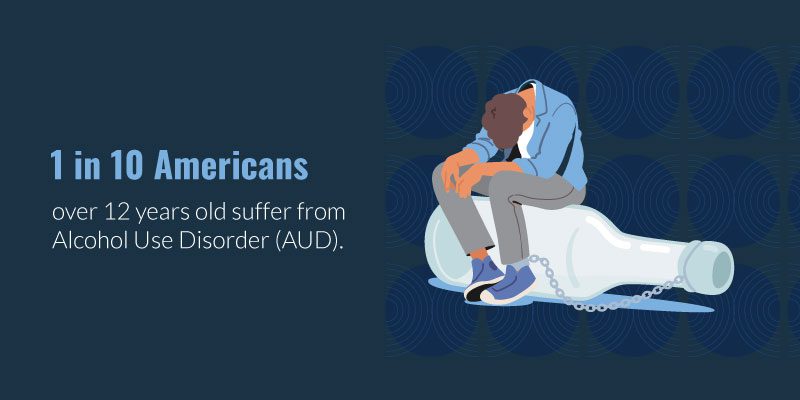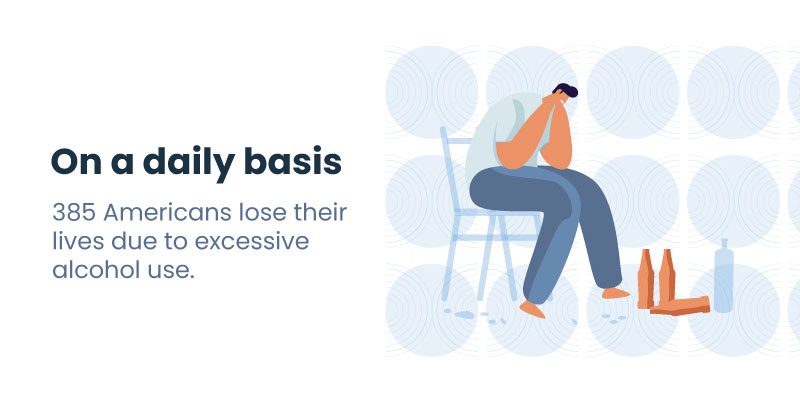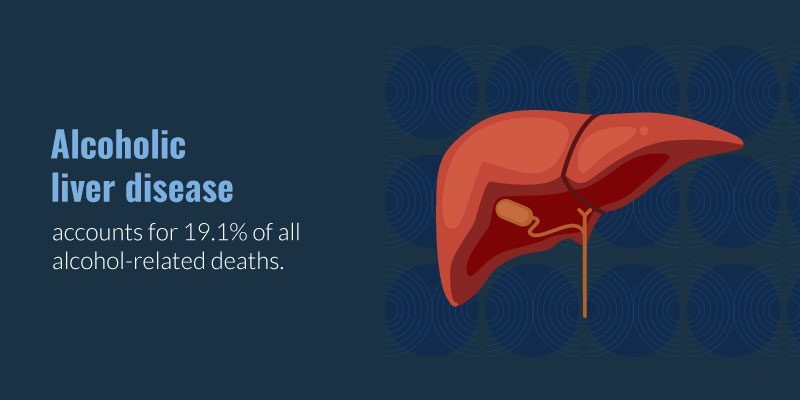Alcohol Addiction Help
We will uncover alcohol addiction help in this in-depth guide, exploring various options, as well as forms of support.
Grasping Alcohol Addiction
Alcohol use disorder (AUD), also known as alcohol addiction, is a condition where drinking becomes uncontrollable. Alcoholism is a significant health challenge worldwide. They account for over 3 million deaths yearly, about 6% of all global deaths.1
Alcohol addiction isn’t a matter of weak willpower; it’s a disease rooted in genetics, environment, and mental health. AUD can develop gradually, making it hard to recognize and seek help.
There are stages of alcohol addiction, each requiring different levels of alcohol addiction help.

What Are the Stages of Alcohol Addiction?
In the early stages, people with AUD may have an increased tolerance for alcohol and display risky drinking behaviors. They might feel they can’t stop drinking even when they want to or experience physical withdrawal symptoms when not drinking.
In the later stages of AUD, individuals typically need more intensive support and treatment. At this point, alcohol addiction has a strong hold on their life.
Importance of Seeking Help
If you’re dealing with AUD, it’s vital to seek alcohol addiction help. AUD does more than damage health. It affects your relationships, job, and mental state.
Ignoring AUD can lead to severe health issues like liver disease, heart problems, mental disorders, and even cancer. In fact, alcoholic liver disease is responsible for 19.1% of all alcohol-related deaths.2
Fortunately, recovery from AUD is possible with the right alcohol addiction help.
Overview of Alcohol Use Disorder
Signs and Symptoms of Alcohol Addiction
It’s essential to recognize the signs and symptoms of AUD so that one can seek the proper alcohol addiction help for recovery. Whether the addiction is in yourself or someone else, recognize the signs of it.
Physical Signs
When seeking alcohol addiction help, it is necessary to understand the physical signs that come with it. Some noticeable changes could be in weight. People battling alcohol addiction may either gain or lose weight rapidly.
Insomnia is another sign of alcohol addiction. Alcohol might seem like it helps you sleep, but it interferes with the quality of your sleep. This could lead to a person feeling constantly tired or restless.
Other physical signs may include constant slurred speech, flushed skin, hand tremors, and chronic stomach problems such as nausea and vomiting. Alcohol addiction help can address these problems.
Behavioral and Psychological Symptoms
Depression is another common symptom. It’s a cycle where alcohol is used to ‘drown’ the feelings of sadness, but it instead deepens the state of depression.3
Changes in personality or behavior are also significant indicators of alcohol addiction. This might include becoming secretive or dishonest, displaying unusual irritability, and having frequent mood swings.

Recognizing Signs of Alcohol Addiction in Loved Ones
Over 12% of children under 17 live with at least one parent dealing with alcohol use disorder, emphasizing the importance of recognizing and addressing signs of addiction in family members. Children mimic who they are around the most.
Identifying alcohol addiction in loved ones could be challenging. Changes in habits can be an early sign. This could be a shift from occasional drinking to frequent and excessive drinking.
What Changes Do I Look For?
Withdrawal from social activities is a telltale sign. The person might start preferring to drink alone or in secret, avoid contact with friends or family, or lose interest in activities they once enjoyed.
Neglect of responsibilities also occurs when dealing with alcohol addiction. This might be evident in areas like work, school, or home duties. In all these scenarios, the common thread is change. Recognizing these changes is a first step towards seeking alcohol addiction help.
Understanding Available Options for Help
Fortunately, there is alcohol addiction help for even the most advanced cases. These will be detailed below.
Professional Help
The broad prevalence of AUD, as evidenced by over 10% of Americans aged 12 and above having AUD in 2020, underpins the necessity to comprehend the various means of support available.
Medical professionals and addiction specialists are trained to provide alcohol addiction help. They can diagnose alcohol addiction using various methods, including physical exams, lab tests, and a thorough review of drinking habits.
After diagnosis, treatment might involve medications to ease withdrawal symptoms or curb cravings. It can also include guidance on healthy habits like nutrition and exercise.
Support Groups and Peer Support
Support groups like Alcoholics Anonymous (AA) offer alcohol addiction help by creating a community of people with similar struggles.
In these groups, alcohol addiction help is provided through conversations, advice, and first-hand accounts of people who have gone through similar experiences.
Hearing other people’s stories can provide comfort, reduce feelings of isolation, and instill hope. This peer support model can be an essential part of recovery.
Counseling and Therapy
Group therapy provides an alcohol addiction help platform where individuals can talk and learn from each other. A professional therapist leads the group, bringing critical insights to conversations and helping participants process their feelings.
What is Group Therapy?
Rehabilitation and Treatment Centers
Every day, alcohol misuse results in the death of 385 Americans, underscoring the demand for effective rehabilitation and treatment strategies to meet the needs of various individuals.
Inpatient Programs
Inpatient programs provide full-time alcohol addiction help. People stay at the treatment facility day and night. They receive medical supervision and a structured routine. This type of program is often best for severe addictions or people who need a stable environment.
Outpatient Programs
Outpatient programs allow people to live at home. They visit the treatment center for scheduled sessions. This type of program offers more freedom. It is well-suited for people with mild to moderate addiction who have a supportive home environment.
For more intense cases of alcohol addiction, there are options to explore in-depth ways to recover from it.

More Rehabilitation and Treatment Centers
In addition to the above-mentioned programs, there are other flexible rehabilitation strategies to meet individual needs.
Partial Hospitalization Programs (PHP)
Partial hospitalization programs, or PHPs, offer daytime treatment at the center. Patients return home in the evenings. PHPs offer a balance between intensive care and personal freedom.
They are a good option for those with a stable home environment who need more alcohol addiction help and support than outpatient care provides.
Intensive Outpatient Programs (IOP)
Intensive outpatient programs, or IOPs, require more time commitment than regular outpatient programs. People attend several treatment sessions each week. The focus is on relapse prevention and coping skills.
IOPs are suitable for those who need more alcohol addiction help than an outpatient program provides but who do not require full-time care.
Sober Living Homes
These residential facilities offer a drug-free environment. They are usually the next step after inpatient treatment.
Sober living homes provide a safe atmosphere where people can practice their recovery skills. It is also a place that offers support and structure while transitioning back to everyday life.
Common Therapeutic Approaches for Alcohol
When looking for alcohol addiction help, there are many methods to choose from. The best approach depends on your unique situation.
Some common therapies include:
Cognitive Behavioral Therapy (CBT)
CBT is one of alcohol addiction help‘s best-known treatments. It is a form of talk therapy that helps people understand the connection between their thoughts, feelings, and behavior.
CBT also helps you learn new ways to deal with situations where you might want to drink. CBT aims to change the thought patterns that lead to heavy drinking.
How Does CBT Work?
Motivational Enhancement Therapy (MET)
MET aims to spark a strong desire to stop drinking. A therapist will work with you to plan how to change. They might look at the pros and cons of quitting alcohol. MET is about creating quick, self-driven change.
Contingency Management (CM)
CM is a rewarding way to get alcohol addiction help. It gives rewards when you reach specific behaviors or goals. The rewards could be vouchers or small cash gifts. CM uses positive reinforcement to support sobriety.
Dialectical Behavior Therapy (DBT)
DBT focuses on a person’s emotions. It teaches skills like mindfulness and how to handle stress. This therapy can be helpful for those who feel a strong urge to drink when they are stressed.
Specialized Treatment Programs
Specialized treatment programs provide goal-oriented steps on the road to recovery. They also connect to people with other issues besides alcohol addiction.
12-Step Facilitation Therapy
The 12-step program is one of the most widely used alcohol addiction help treatments. It involves attending group meetings and working with sponsors to stay sober.
The goal is to better understand addiction and learn how to live without alcohol.
Dual Diagnosis Treatment
Sometimes, people who are addicted to alcohol have other mental health conditions. Alcohol addiction help for these people is called dual diagnosis treatment.5
These programs can treat both problems at the same time. Treatment usually involves counseling, medication, and other therapies. The aim is to break the link between the two issues and achieve lasting sobriety.
Holistic Treatment
In holistic treatment, the goal is to heal the mind, body, and spirit. This type of alcohol addiction help may include yoga, meditation, nutrition counseling, and massage therapy. The focus is on helping you find balance in all areas of life.
More Specialized Treatment Programs
More specialized treatment programs help specific groups of people on their road to recovery.
Gender-Specific Programs
Gender-specific treatment programs are designed to meet the needs of men and women who have different experiences with alcohol addiction. It also helps address any specific issues or challenges they may face when it comes to sobriety.
For example, a program for women might deal with body image or childcare issues. A program for men might focus on anger management or career challenges.
LGBTQ+ Affirmative Treatment Programs
These programs offer alcohol addiction help in a safe and supportive environment for LGBTQ+ individuals. They can tackle issues like discrimination or family rejection, which can sometimes be linked to alcohol addiction.
Faith-Based Treatment Programs
These programs involve religious beliefs in the recovery process. This can be comforting for those who hold their faith dear. They might include prayer, meditation, or spiritual counseling.
All these approaches provide different ways to get alcohol addiction help. The best one depends on the individual’s needs and preferences. No matter the situation, there are many ways to get support. Remember, seeking help is the first step toward recovery.

Medications and Detoxification
Detoxification and medications can reduce the risks associated with long-term alcohol abuse and addiction. They can make the process easier and safer. Here’s a deeper look at how they can help.
Pharmacological Treatments
Pharmacological treatments use medication to assist those who need alcohol addiction help.
A few common medications include:
- Disulfiram: Discourages drinking by making you feel sick if you consume alcohol.
- Naltrexone: Reduces the pleasant effects of alcohol, thus lessening the desire to drink.
- Acamprosate: Eases discomfort and reduces the urge to drink when someone stops after a long period of heavy alcohol use.
- Baclofen: Eases alcohol withdrawal symptoms such as anxiety and cravings.
- Topiramate: Reduces the craving for alcohol and makes it less enjoyable if you consume it.
It’s important to note that these medications are not a standalone treatment. They should be used in combination with counseling and therapy programs.
Detoxification
Detoxification can reduce withdrawal symptoms and make the process easier, but it does not address psychological issues or solve alcohol-related problems.
During detox, you may also experience withdrawal symptoms. Common symptoms include anxiety, shaking, insomnia, nausea, sweating, and irritability. Supportive care during detox provides mental health support to cope with emotional challenges.
Resources and Support for Loved Ones
These programs provide support for family members and friends of someone who has an alcohol addiction.
Family Education and Therapy
Family therapy helps family members understand the nature of addiction, how to support their loved one during recovery, and develop healthy communication skills.
Education programs help family members recognize warning signs of relapse, provides guidance on coping with difficult behaviors, and teach the importance of self-care and setting healthy boundaries.
Al-Anon and Alateen
Al-Anon and Alateen are support groups for family and friends of loved ones who struggle with alcohol addiction. Al-Anon is for adults, while Alateen is for teens.
These programs provide a safe place to share experiences and learn coping skills. Members of Al-Anon and Alateen also have access to 24-hour hotlines, online meetings, and other resources for managing stress.
Online Communities and Forums
Websites like Sober Recovery and In The Rooms offer an online community of people in recovery from addiction.
Members can share stories, ask questions, get advice from mentors and professionals in the field of addiction, and find support in other ways.
Intervention
In some cases, you may need a professional interventionist who has specialized training in addiction, communication techniques, and effective strategies for helping people make changes.
Navigating Alcohol Addiction Help
It takes some careful consideration when you begin the process of seeking alcohol addiction help. But the path to recovery is worth the effort.
Best Time to Seek Help
The best time to seek help is when someone has acknowledged they have a problem with alcohol addiction and are willing to make a change.
The longer the addiction persists, the more difficult it becomes to overcome. Reaching out for help shows strength and courage and can be a life-saving step.
Assessment Process
Every person is unique. That’s true when seeking alcohol addiction help, too. Before starting treatment, you’ll go through an assessment process.
This will involve talking to a doctor or addiction specialist about your medical and mental health history, current symptoms, substance use patterns, and other factors.
Set Realistic Expectations
When seeking alcohol addiction help, it’s important to set realistic expectations. Recovery is a process that takes time and requires ongoing effort.
It’s not uncommon for individuals to experience setbacks or relapses. Rather than viewing these as failures, they should be seen as part of the recovery journey and opportunities to learn and adjust the treatment plan.
Financial Considerations
Paying for alcohol addiction help can be a worry for many. But it’s good to know that many health insurance plans cover addiction treatment.
It’s helpful to check with your insurer to see what’s covered. There may also be public or charity programs available to help with costs.

Choice House: Providing Alcohol Addiction Help
Choice House is a supportive environment that offers comprehensive alcohol addiction help. It’s situated in the scenic beauty of Boulder County, Colorado, offering a serene place for recovery.
Whatever your stage of recovery, Choice House has a program tailored to your needs. We provide several levels of care, including inpatient treatment, PHP, outpatient programs, IOP, and family support services.
Treatment Approaches at Choice House
Choice House is not just a Colorado-based alcohol addiction help center; we also provide assistance with other substances, from marijuana and cocaine to prescription drugs. With such a wide range of expertise, individuals seeking help can be confident in the comprehensive care they receive.
Choice House uses several approaches to provide alcohol addiction help. We use therapies like cognitive behavioral therapy, which helps people change unhealthy behaviors. We also use medications to reduce cravings for alcohol.
Before beginning any treatment program, our experienced Choice House staff conducts an assessment. This helps create a personalized recovery plan that meets your goals and lifestyle.
Support and Aftercare Services
Choice House ensures that the journey to recovery doesn’t end after treatment. We provide a robust support network for aftercare. This is built on a sense of community among men recovering, which is fostered in our environment.
We aim to build deep connections and promote growth through a commitment to honesty, integrity, and work ethic.
Successful recovery at Choice House depends on individuals’ willingness to embrace recovery, community, new ideas, and spiritual principles. This ethos defines our mission to guide individuals to freedom, personal growth, and lasting sobriety.
Resources
- https://drugabusestatistics.org/alcohol-abuse-statistics/
- https://www.ncbi.nlm.nih.gov/pmc/articles/PMC3307043/
- https://www.webmd.com/depression/guide/alcohol-and-depresssion
- https://www.webmd.com/mental-health/addiction/counseling-and-addiction-how-therapy-can-help
- https://www.ncbi.nlm.nih.gov/pmc/articles/PMC6761814/
- https://alcohol.org/intervention/
